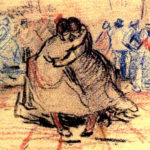We run our website the way we wished the whole internet worked: we provide high quality original content with no ads. We are funded solely by your direct support. Please consider supporting this project.

Did Yahweh Crush His Son?
Though Isaiah was probably referring to the nation of Israel as Yahweh’s “suffering servant” when these words were penned, the NT authors as well as other early church fathers interpreted this servant to be a prophetic reference to Christ. Speaking proleptically, Isaiah declares that this suffering servant was “punished” and “stricken by God” (Isa 53:4, cf., v. 8) and states that “it was the LORD’s will to crush him and cause him to suffer” (vs. 10). The passage thus seems to depict Yahweh as the one who “pierced” his servant “for our transgressions” and who “crushed” his servant “for our iniquities” (vs. 5).
At the same time, while Isaiah ascribes violent verbs to God, he also describes the suffering this servant underwent as the result of humans afflicting him. It was humans who “despised and rejected” this servant as they “hid their faces” from him (v. 3). It was before accusing humans that this servant “did not open his mouth” (v. 7), and it was violent humans who “oppressed and afflicted” this man (v. 7). So too, it was by human “oppression and judgment” that this man “was taken away … cut off from the land of the living” and “was assigned a grave with the wicked” (vv. 8-9). And it was humans from among “his generation” who failed to protest this man’s unjust treatment at the hands of other humans (v. 8). It is thus clear that for Isaiah, as much as for NT authors, Christ was “afflicted” by God only in the sense that it was God who delivered him over to violent humans to experience the death-consequences of our transgressions.
Why then does Isaiah say that the suffering servant was “punished” and “stricken by God” and that “it was the LORD’s will to crush him and cause him to suffer”? I would like to propose that the Father allowed himself to be portrayed as doing something he merely permitted for the same reason the Son takes on an appearance that makes him look guilty of crimes he merely allowed. In this case, the Father’s willingness to take on the semblance of the one who afflicted his Son is simply the flip side of the Son’s willingness to take on the semblance of one who deserved to be afflicted.
This is not to suggest that Isaiah or his original intended audience understood the matter this way. There are plenty of other passages in Isaiah that clearly reflect a pen-ultimate, sub-Christlike understand of Yahweh’s character. Isaiah clearly did not think Yahweh was above engaging in horrific violence. We can discern the humble, stooping cruciform God in the depth of these violent portraits. Here, we can also discern how God the Father was stooping to wear the mask of someone who is responsible for wrongdoings that he merely allowed, just as he does on the cross. The Creator, in other words, is taking responsibility for all that comes to pass in his creation, including the unjust suffering of his beloved servant.
Photo credit: KayVee.INC via Visual Hunt / CC BY-NC-SA
Category: General
Tags: Cruciform Theology, Jesus, Violence
Topics: Attributes and Character
Related Reading

Podcast: Does a Jesus-Centric Theology Reduce God?
Greg challenges the traditional starting point of many theologies and defends starting our theology about God’s nature and character with what has been revealed about Jesus. http://traffic.libsyn.com/askgregboyd/Episode_0325.mp3

What’s the Purpose of the Old Testament Law?
Whereas the old covenant was rooted in the law, the new covenant is rooted in simple faith, such as Abraham had. Whereas the old covenant was forged with one particular nation, the new covenant is available to all who are willing to accept it, regardless of their ethnicity and nationality. Whereas forgiveness of sins within…

Jesus: Our Vision of God
At the beginning of his Gospel John taught that “no one has ever seen God, but the one and only Son, who is himself God and is in closest relationship with the Father, has made him known” (Jn 1:18). He is claiming that, outside of Christ, no one has ever truly known God. In the…

What Does It Mean to Be Married to Christ?
The New Testament calls Christ the “bridegroom” and the church his “bride.” To understand what this means can change your life. We need to read this through the lens of first century Jewish marriage. In what follows we’ll highlight six aspects of first century Jewish marriages to see how each sheds light on the New…

The Only Thing That Matters Is Love: The Kingdom of God (Part 3)
To say that living in Calvary-quality love is the most important thing in our life is to grossly understate its importance. This stands in distinction from how we typically define the Kingdom of God. But it stands in line with the fact that Jesus is the Kingdom of God. Paul says the “the only thing…

Podcast: Can We Still Take Comfort in the Old Testament?
Greg considers the Old Testament revelations that are consistent with Christ crucified. http://traffic.libsyn.com/askgregboyd/Episode_0199.mp3
